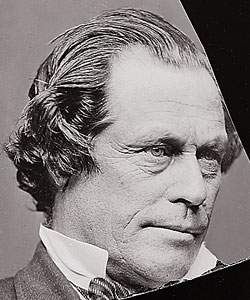Owen Lovejoy (Congressional Biographical Directory)
Reference
LOVEJOY, Owen, (cousin of Nathan Allen Farwell), a Representative from Illinois; born in Albion, Maine, on January 6, 1811; attended the common schools and was graduated from Bowdoin College, Brunswick, Maine, in 1832; studied law but never practiced; studied theology; moved to Alton, Madison County, Ill., in 1836; ordained pastor of the Congregational Church in Princeton, Ill., 1839-1856; member of the State house of representatives in 1854; elected as a Republican to the Thirty-fifth and to the three succeeding Congresses and served from March 4, 1857, until his death in Brooklyn, N.Y., March 25, 1864; chairman, Committee on Agriculture (Thirty-seventh Congress), Committee on District of Columbia (Thirty-eighth Congress); interment in Oakland Cemetery, Princeton, Ill.
“Lovejoy, Owen,” Biographical Directory of the United States Congress, 1774 to Present, http://bioguide.congress.gov/scripts/biodisplay.pl?index=L000462.
Owen Lovejoy (American National Biography)
Scholarship
In the 1840s Lovejoy became an active political abolitionist, running unsuccessfully for Congress as a Liberty party candidate in 1846. In August 1848 he attended the Free Soil convention in Buffalo and again ran unsuccessfully as that party's candidate for Congress from Illinois's Fourth District. During these years he modified his antislavery stance, rejecting the argument of the more radical abolitionists that slavery should be attacked wherever it existed in favor of advocacy of the Wilmot Proviso, which would contain slavery and prevent its expansion into territories acquired during the Mexican War. With other Free Soilers, he opposed Stephen A. Douglas's Kansas-Nebraska Act in 1854 and joined in the unsuccessful efforts that year to form the Illinois Republican party. In doing so he urged antislavery radicals to moderate their demands to facilitate unity in a new party.
The Whig party in Illinois died more slowly than in many other northern states, and Lovejoy was among the most active in persuading members to join the new Republican organization rather than its rival, the anti-immigrant Know Nothing party. Among those he befriended in these efforts was Abraham Lincoln. In 1856 Lovejoy was a delegate to the state and national Republican conventions, and that fall he won a seat in Congress as a Republican, beginning eight years of antislavery agitation in the House of Representatives.
Lovejoy campaigned actively in Illinois for Lincoln's election as president in 1860. A supporter of a vigorous prosecution of the war effort against the Confederacy, he sought to persuade President Lincoln and the Congress to move more quickly toward emancipation.
The Whig party in Illinois died more slowly than in many other northern states, and Lovejoy was among the most active in persuading members to join the new Republican organization rather than its rival, the anti-immigrant Know Nothing party. Among those he befriended in these efforts was Abraham Lincoln. In 1856 Lovejoy was a delegate to the state and national Republican conventions, and that fall he won a seat in Congress as a Republican, beginning eight years of antislavery agitation in the House of Representatives.
Lovejoy campaigned actively in Illinois for Lincoln's election as president in 1860. A supporter of a vigorous prosecution of the war effort against the Confederacy, he sought to persuade President Lincoln and the Congress to move more quickly toward emancipation.
Frederick J. Blue, "Lovejoy, Owen," American National Biography Online, February 2000, http://www.anb.org/articles/04/04-00643.html.








